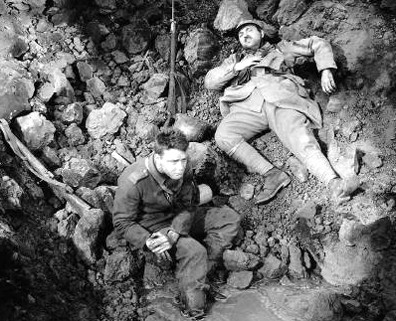Perhaps you are looking forward to falling asleep in front of a mediocre DVD on Christmas Day as you digest an oversized lunch. But if you care for a more stimulating afternoon, I can recommend treating yourself to an empathy film instead. So, what are the options?
A fascinating genre that can expand our empathetic imaginations is war movies depicting the perspective of enemies. Recent examples include a pair of films directed by Clint Eastwood in 2006 about the Battle for Iwo Jima in the Second World War, one from the viewpoint of US soldiers (Flags of Our Fathers), and the other seen through the eyes of Japanese soldiers (Letters from Iwo Jima), which is entirely in Japanese. The inverted lens challenges simplistic notions of nationalism, patriotism and triumphalism, and makes war seem far from glorious while at the same time breaking down the barriers between ‘us’ and ‘them’.
But if you are a purist, you will sit yourself down in front of the first – and greatest – film in the genre, the 1930 version of All Quiet on the Western Front. This classic is based on the novel by Erich Maria Remarque, a German veteran of the First World War. It is astonishing that an anti-war movie from the perspective of a German soldier was produced in Hollywood only a dozen years after the armistice. But, for me, an even greater achievement is that it contains the most moving empathetic episode in cinema history.
The main character, a German footsoldier named Paul, who has enlisted in the fervour of schoolboy patriotism, is now on the Western front facing the French. Surrounded by gunfire, he jumps into a trench for cover. An instant later, a French soldier drops into the trench with him. Without a moment of thought, Paul draws his dagger and stabs him in the chest.
To find out what happens next, either watch this clip (the first seven minutes), or read the description below.
The soldier is mortally wounded, but still breathing. Paul washes the blood off his hands and the soldier writhes before him, slowly dying. The gunfire continues and Paul, forced to stay in the trench overnight, cannot avoid the face of the soldier, whose eyes are still open. At first he is irritated by the Frenchman’s wheezing, final breaths, but with the passing hours he is overcome by remorse. ‘I want to help you,’ Paul pleads, offering his enemy a little water. But it is too late, the soldier is unmoving, which prompts an anguished soliloquy:
‘I tell you I didn’t want to kill you. I tried to keep you alive. If you jumped in here again, I wouldn’t do it. You see, when you jumped in here, you were my enemy – and I was afraid of you. But you’re just a man like me, and I killed you. Forgive me, comrade. Say that for me. Say you forgive me!…Oh, no, you’re dead! Only you’re better off than I am – you’re through – they can’t do any more to you now…Oh, God! why did they do this to us? We only wanted to live, you and I. Why should they send us out to fight each other? If they threw away these rifles and these uniforms, you could be my brother.’
Though Paul has come to see his adversary as a fellow human being who has similarly been used as a pawn by the generals and politicians, there is still a final moment of empathetic recognition to come. Paul reaches inside the soldier’s coatpocket and draws out his identification papers. He has a name, Gerald Duval, and inside is a photo of his wife and daughter. Paul now understands that he has killed not only a brother in arms, but a unique individual, with a family, with emotions, with a home to go to, just like him. ‘I’ll write to your wife,’ he tells the dead man. ‘I’ll write to her. I promise she’ll not want for anything. And I’ll help her, and your parents, too. Only forgive me. Forgive me. Forgive me….’ He weeps, his head at the feet of the frozen body of Gerald Duval.
After this small taste of All Quiet on the Western Front, you may well feel able to give James Bond or Lord of the Rings a miss on Christmas Day, and instead opt for a film experience that reveals not just the horrors of war – both in the past and the present – but what it means to be human.

Hi Roman,
First of all, I want to say how much I like your blog!
With regard to this post, I was fortunate enough to happen upon All Quiet on the Western Front as an eight year old child. Perhaps because I had recently lost my own dad this film particularly engaged my empathic imagination and it had a powerful, positive and lasting effect on me.
This Christmas, however, I have not spent one second watching the goggle-box; among other things, I have had a wonderful time playing – and I mean playing (which should be italicised, except my HTML skills don’t stretch to that!) – with my youngest daughter, as she began to play her new guitar. We made some music together, and shared a load of laughs.
Hope you’ve had a fantastic time too!
All the very best
Colin <(